|
|
|
Sort Order |
|
|
|
Items / Page
|
|
|
|
|
|
|
| Srl | Item |
| 1 |
ID:
126761
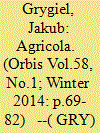

|
|
|
|
|
| Publication |
2013.
|
| Summary/Abstract |
Gnaeus Julius Agricola (40-93 AD) is a man for our times. Facing the capriciousness of imperial power, he, a successful provincial Roman governor, chose to withdraw from public administration. Yet, by protecting his family, Agricola did not shirk politics. On the contrary, he retreated to the founding cell of any polity, the family, which buttresses and at the same time limits the state. By doing so, Agricola reached greatness despite living under bad emperors.
|
|
|
|
|
|
|
|
|
|
|
|
|
|
|
|
| 2 |
ID:
093943
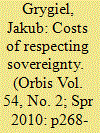

|
|
|
|
|
| Publication |
2010.
|
| Summary/Abstract |
Respect for sovereignty can be an effective tool to manage relations between states, drawing boundaries of acceptable behavior. But there are also clear costs of respecting sovereignty. A foreign policy based on a principled defense of sovereignty can be, in fact, morally wrong, politically illegitimate, and strategically dangerous. This does not mean that sovereignty should be broken wantonly, but only that prudential judgment must be exercised to weigh the costs and benefits of respecting the sovereignty of a state. In the end, our security and our values, not the principle of sovereignty, should be the metric by which we should judge the necessity and legitimacy of U.S. actions.
|
|
|
|
|
|
|
|
|
|
|
|
|
|
|
|
| 3 |
ID:
123285
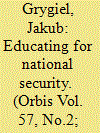

|
|
|
|
|
| Publication |
2013.
|
| Summary/Abstract |
National security is not simply a matter of technical skills and university degrees. To maintain power, engineering skills and knowledge of math are undoubtedly indispensable, but so is a solid understanding of, and appreciation for, the state's civilizational underpinnings-the religious beliefs, political ideals, and moral virtues. An education for national security must start from the desire to learn and understand one's own national culture and tradition to be able to identify what one is supposed to defend. And herein lies our biggest challenge: we are becoming increasingly more skilled at how to defend ourselves, but we are losing the tools to understand what we are expected to protect. We can do a lot but we are uncertain why we should.
|
|
|
|
|
|
|
|
|
|
|
|
|
|
|
|
| 4 |
ID:
121572
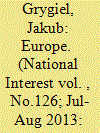

|
|
|
|
|
| Publication |
2013.
|
| Summary/Abstract |
THE EUROPEAN Union's unfolding crisis tends to be seen as purely economic in nature and consequence. The EU is a common market, with a common currency adopted by most of its members and with fiscal problems of one kind or another facing almost all of its capitals. Most analyses of the euro crisis focus, therefore, on the economic and financial impact of whatever "euro exit" may occur or of a European fiscal centralization. In the worst case, they project a full-fledged breakup of the common currency and perhaps even the EU itself. Not much can be added to this sea of analysis except a pinch of skepticism: nobody really knows the full economic impact, positive or negative, of such potential developments. In fact, not even European leaders seem to have a clear idea of how to mitigate the economic and political morass of the Continent. While it is certain that the EU of the future will be different, it isn't clear just how.
|
|
|
|
|
|
|
|
|
|
|
|
|
|
|
|
| 5 |
ID:
143267
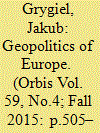

|
|
|
|
|
| Summary/Abstract |
This article contends that “Europe” is a term that describes a geographic reality that aspires to be a political one. Specifically, it highlights the illusions of unity and the delusions of international harmony that permeate Europe's politics today. It concludes by suggesting that the threat that Russia is presenting most immediately in Ukraine but more broadly to Europe as a whole is extremely serious and will alter in some form, hopefully positive, the European continent.
|
|
|
|
|
|
|
|
|
|
|
|
|
|
|
|
| 6 |
ID:
068654
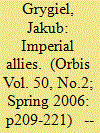

|
|
|
| 7 |
ID:
133634
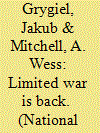

|
|
|
|
|
| Publication |
2014.
|
| Summary/Abstract |
EUROPE NEEDS to rearm and defend itself to cope with a new military threat. The American security umbrella-in both its conventional and nuclear forms-is no longer adequate, particularly on NATO's vulnerable eastern flanks. Indeed, the extended deterrent provided by the United States to its most exposed allies may not be well suited to inhibiting attacks similar to Russia's recent incursion into Ukraine, which displayed all the hallmarks of the newly popular limited conventional wars-brief and decisive, violent and yet very restrained. The purpose of such conflicts is to achieve a quick fait accompli in a geographically circumscribed area through limited force-in this case, paramilitary means followed by Russian regular forces. It is difficult to deter such a threat through the promise of retaliation, which by its very nature must occur after the facts on the ground have already been changed. A threat of retaliation is simply less credible when the enemy has achieved his objective through a low-intensity action. What are needed instead are strong local military capabilities-a preclusive defense-that increase the costs of that limited attack. Europe must start to defend its border rather than indulge in the belief that the traditional formula for deterrence, based on retaliation and the extended deterrent provided by the United States, will suffice. It won't.
|
|
|
|
|
|
|
|
|
|
|
|
|
|
|
|
| 8 |
ID:
173874
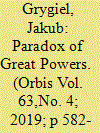

|
|
|
| 9 |
ID:
090332
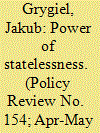

|
|
|
| 10 |
ID:
120170
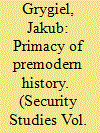

|
|
|
|
|
| Publication |
2013.
|
| Summary/Abstract |
The study of premodern history would greatly improve our understanding of current and future strategic challenges. Premodern international relations, in fact, have certain characteristics that are reappearing in our times. I underline three such features: the presence of non-state actors, the pursuit of nonmaterial objectives, and the difficulty of diplomacy and deterrence. As a result, international relations were often characterized by conflicts "below the military horizon," timeless violent confrontations rather than wars. The paper concludes with an analysis of current trends that are bringing back some of these premodern traits and suggests several hypotheses for further research.
|
|
|
|
|
|
|
|
|
|
|
|
|
|
|
|
| 11 |
ID:
147109
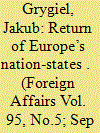

|
|
|
|
|
| Summary/Abstract |
Europe currently finds itself in the throes of its worst political crisis [1] since World War II. Across the continent, traditional political parties have lost their appeal as populist, Euroskeptical movements have attracted widespread support. Hopes for European unity seem to grow dimmer by the day. The euro crisis [2] has exposed deep fault lines between Germany and debt-ridden southern European states [3], including Greece and Portugal. Germany and Italy have clashed on issues such as border controls and banking regulations. And on June 23, the United Kingdom became the first country in history to vote to leave the EU—a stunning blow to the bloc.
|
|
|
|
|
|
|
|
|
|
|
|
|
|
|
|
| 12 |
ID:
106888
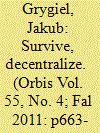

|
|
|
|
|
| Publication |
2011.
|
| Summary/Abstract |
What happens when states or empires face multiple and geographically dispersed assaults along their frontiers from non-state, tribal actors? It is plausible to argue that the result may be state decentralization, both military and administrative. In some cases, this may be a conscious strategy pursued by the central authorities, but in others, it may be the result of centrifugal tendencies pursued by disaffected local leaders. This article illustrates this argument by describing the end of the Roman empire, caused by multiple assaults of barbarian groups. The lesson is that in such an environment a centralized state that arrogates to itself all the functions of security provision may undermine its own safety.
|
|
|
|
|
|
|
|
|
|
|
|
|
|
|
|
| 13 |
ID:
163942
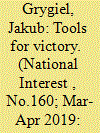

|
|
|
|
|
| Summary/Abstract |
The Trump administration’s foreign policy can be understood as driven by the recognition that choices are limited, and the last one—reforming the existing alliances—is the best bet.
|
|
|
|
|
|
|
|
|
|
|
|
|
|
|
|
|
|
|
|
|